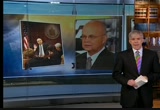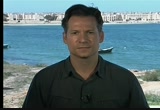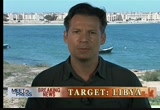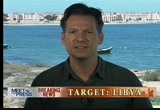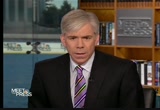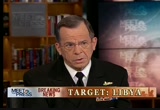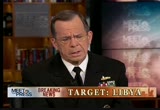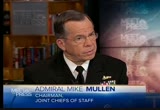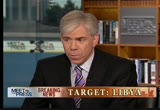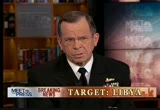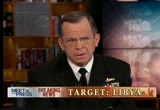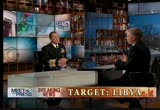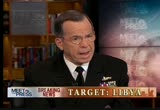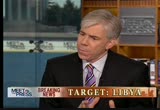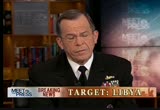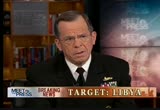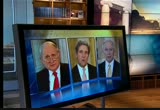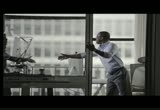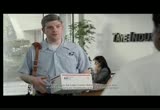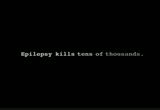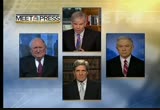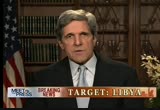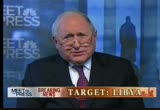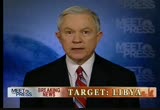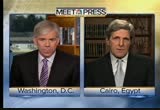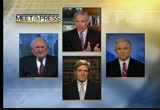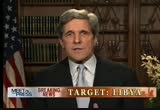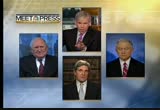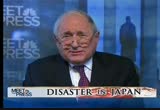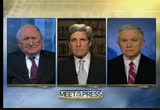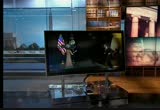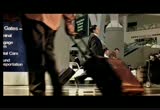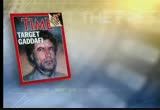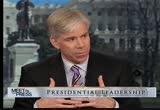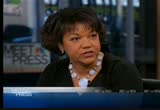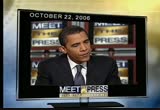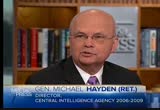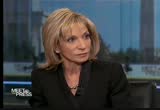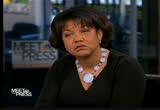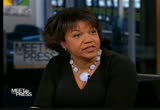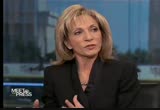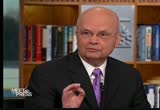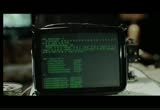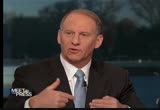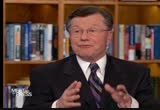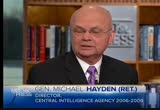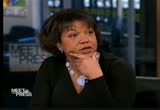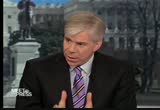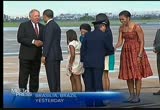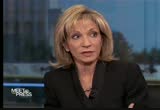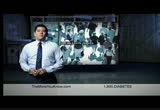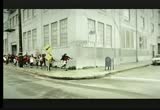tv Meet the Press NBC March 21, 2011 3:00am-4:00am PDT
3:00 am
pentagon correspondent jim miklaszewski, ha lean cooper, former director of the cia, general michael hayden, and president of the counsel of general michael hayden, and president of the counsel of foreign relations, richard haas. captions paid for by nbc-universal television good morning. libyan leader moammar gadhafi took to the airwaves this morning vowing to stay in fight and calling the air strikes tantamount to terrorism. anti-aircraft painted the skies after operation odyssey dawn was launched to prop up rebel forces. earlier in the day, the french took the lead as their war planes patrolled the skies over libya and struck pro-gadhafi tanks. u.s. and british forces followed by launching a volley of more than 100 cruise miss ells and heavy bombing.
3:01 am
the u.s. currently has at least 11 naval vessels in the mediterranean in addition to surveillance aircraft. all of this in preparation to impose a u.n.-sanctioned no-fly zone, the largest military intervention since the invasion of iraq in 2003, eight years to the day. i want to go right to nbc's chief foreign affairs correspondent richard engel in tobr tobruk, libya. tell me what you've been seeing and experiencing. >> reporter: the roads are remarkably calm. people are out on the streets. i spoke with rebels just a short while ago. they say that finally this action has taken place and they hope that they can get some more momentum again. i was here in this area about a week ago when the tide of events seemed to be turning against the rebels and you didn't see them out much. they were abandoning their checkpoints. now, once again, their
3:02 am
checkpoints are out and they were painting anti-gadhafi graffiti once again openly on some of the buildings. so they feel that they have a renewed sense of optimism and they hope to regain the momentum in this fight. >> too little too late is a question you keep hearing, richard. i've heard your reporting on this. they had momentum a couple of weeks ago. >> reporter: they certainly did. and the rebels are asking, why didn't this come even a few days ago? before the major push into benghazi, which appears to have been repulsed actually took place at all. they had momentum right when they began, and as soon as they left benghazi they found themselves being crushed from the air. an air cover, an air cap over eastern libya will give the rebels time to regroup, they say, time to take care of some of their wounded and perhaps learn from some of the mistakes that they made in the early days and try and advance with a
3:03 am
little bit more skill and patience than they certainly exhibited in the last time they tried to march toward libya, which was really just wildfiring into the air and a completely uncoordinated effort. >> richard, finally, based on your experience in the region and your reporting, what is gadhafi up to? >> reporter: gauf 50 seems to be laying the ground for an insurgency. he said he will give out today a million weapons to men and women mostly around tripoli. he announced yesterday he will be opening the armory for all libyans who want to fight to defend their country. and he said today that there will be a long war for libya. so he seems to be preparing for allowing his people to fight and to drag the west and drag the rebels here in the east in some sort of war of attrition. >> quickly,there any sense that he's feeling more pressure than he has in the past that somebody around him might kill him or he might decide to step down?
3:04 am
>> reporter: the one indication that he might be feeling physical pressure is that he has invited hundreds of supporters to live in presidential compounds effectively as human shields. that is something that the u.s. is clearly going to be concerned about and there have been people volunteering to go to sites that could be attacked by american or other western -- missiles or air power. so that could be an indication that he is nervous. >> our chief foreign correspondent richard engel, thank you very much. joining me now, the top military adviser the chairman of the joint chiefs of staff, admiral mike mullen. welcome back to "meet the press." are we at war with libya? >> we started yesterday limited operation in narrow focus on supporting the united nations security council resolution, which very specifically focused on humanitarian efforts,
3:05 am
protecting the civilians in libya, and i'd also say that operations yesterday went very well. certainly -- and putting in place a no-fly zone, which is what we're doing right now, and effectively he hasn't had any aircraft or helicopters fly in the last couple of days so effectively that no-fly zone has been put in place. >> but just to speak plainly about it, as you've said, any no-fly zone begins with an act of war. this is war against libya. >> well, what we did certainly is we took out his radars, his ability to, for the most part, attack us from the ground. that's how you start to set up a no-fly zone. again, it's very focused on ensuring that he can't execute, continue to execute, his own people. and we don't see any indications of any kind of large-scale
3:06 am
massacre at this particular point in time. >> let's look at the map here and talk about both the geography and some of the strikes. these are, according to the defense department, where some of the strikes are, obviously tripoli, which is where gadhafi is, in benghazi you don't see any strike points on that particular map. we know from our reporting out of our own folks at the pentagon that b-2 bombers were deployed, dropping some 40 bombs against air defense systems within libya. what is the concentration in tripoli versus benghazi? >> i think as you look at that, most of those targets were part of his air defense system. we also hit some of his airfields, again, this these are prerequisites for establishing a no-fly zone. then we put combat air patrol, c.a.p., in various places, and we've got aircraft stationed above benghazi right now on a
3:07 am
24/7 basis. then what we'll do is we'll move that c.a.p.'ing capability, those aircraft over time further to the west. but most of those strikes took out his air defenses and hit his airfields. >> is there more to be done to limit his capacity to either attack planes or to attack rebels? >> some of the engagements yesterday included attacking his forces on the ground in the vicinity of ben gghazibenghazi. clearly the objective will be to attack those forces and ensure that they are unable to continue to attack the innocent civilians, which he was doing as recently as yesterday morning in benghazi. >> what about civilian casualty snz libyan tv as you might expect have said there have been civilians hit. can we confirm that? >> all of these targets were looked at in absolutely minimizing collateral damage. the reports i have seen have
3:08 am
indicated minimum collateral damage. i have not seen any reports civilian casualties, and i think true to form what gadhafi has done is put in place both human shields in some cases as well as created or said that we have generated civilian casualties. i just haven't seen that. >> what else do you expect him to do in the coming hours and day? there's a stockpile believed to be of mustard gas. he's talked about lashing out using terrorism against western interests. what do you expect? >> we've focused very heavily on the chemical capability that he has and don't see any indication that that's -- that he's moving on that. we've been focused on that for days. this is -- yesterday and today is the first phase of a multiphase operation, but what we expect is him to stay down, not fly his aircraft, not attack
3:09 am
his own people, and to allow the humanitarian efforts, which is such a significant part of the united nations resolution, to take place. >> the goal, as the president has stated it, is to protect civilians, but he's also made it very clear that gadhafi has to go. how would this kind of limited military operation can you achieve that goal? >> well, in the next few days, david, first of all i would expect us to pass the leadership of the military operation to be led by those in the coalition. and that the united states in particular would support, with unique capabilities -- which could include jamming intelligence support, the kinds of things that, tanker support, those kinds of things -- and then to support the kind of humanitarian effort that i talked about. and then i think over time obviously colonel gadhafi is going to have to make some decisions. clearly there's been significant
3:10 am
international isolation, significant sanctions, and arms embargo, and a very broad coalition internationally to isolate him. i think he's going to have to make some choices about his own future at that point. >> but maybe we had a lot of faith in him making the right choices since we've been after him for decades. he hasn't done that. do we have it in our interest and our plans to go get him? >> certainly we've looked at, as we prepared for this, all kinds of options. the president's been very clear, that we're not going to put any boots on the ground. this isn't about occupation in any way, shape or form. >> but what if it doesn't work, wha what/if the goal preventing civilian death or get him out of power doesn't work? >> certainly the no-fly zone will help us to continue to attack and monitor his forces and at least initially it looks like it's had a positive impact
3:11 am
in terms of preventing further civilian casualties. i think the "what happens next" and speculating about that, there's uncertainty associated with that. the whole idea is to put as much pressure on this guy so he doesn't continue to kill his own people and isolate him internationally, which he is, i believe, more than he has ever been. >> but isn't it a legitimate -- it's not just a diplomat question, it's a military question. if the goals do not prevent gadhafi from going, what do we do? there's a prospect of a divided libya, gadhafi holed up. >> this is certainly the goals of this campaign right now, again, are limited and it isn't about seeing him go. it's about supporting the yuunid nations resolution which talked of eliminating his ability to kill his own people as well as support the humanitarian -- >> so the mission can be
3:12 am
accomplished and gadhafi remain in power? >> that's certainly potentially one outcome. >> is this in our vital interest as a country zm. >> i think the president has made it very clear that our national interests are tied to a country that is so close to us in the mediterranean that borders egypt and tunisia, two countries that are also undergoing significant change as we speak, and clearly the focus on the humanitarian piece in terms of someone who has massacred his people in the past and preventing that. in that regard, it is. >> but there are also questions about the double standard here. why do we make a move on libya and yet in bahrain where saudi sent troops in to help a monarchy, we stand back? >> again, this mission is very focused on libya and we're paying a lot of attention to what's going on in bahrain and in the persian gulf as well. and the other thing is, each one
3:13 am
of these countries i think is different. we've tried to focus on it in a different way. we've had a great friendship with bahrain for many, many decades. we've got one of our main naval bases there. and we're working hard to support that in a way to certainly see a peaceful outcome there in terms of how it evolves when the bahraini people are asking for change as well. >> is it possible that it's too late to really make a difference here? had a no-fly zone been implemented a couple of weeks ago when the rebels had more momentum, that that would have been the time to act and it's now too late? >> i think that's speculation, david. i just don't know that going two weeks ago would have turned this one way or another. essentially i think it was important to obviously have the international sanctioning, the united nations resolution and the coalition, broad coalition, which both condemns him and
3:14 am
actually acts against him in terms of implementing the specifics of the no-fly zone. >> how long will this go on? >> it's hard to say how long it will go on. over the last 24 hours there's been a significant amount of progress. as i said, effectively the no-fly zone has been put in place. we have halted him in the vicinity of benghazi, which where he was most recently on the march. it's hard to say what will happen in the next few days or weeks. >> what happens if gadhafi goes? are we prepared to see the rebels put forward a leader for that country? >> well, we've actually been in touch with the opposition in terms of understanding what they want, but i think there's certainly aloft work to do to look at what the next steps would be with respect to what would happen in that country, and that would principally be left up to the people in libya. >> a third war in a muslim country, eight years after the invasion of iraq? is this simply too much for the united states to take on?
3:15 am
>> certainly i'm very much aware of the significant steps we've taken and that this is certainly another -- an additional fight. that said, we're more than capable of meeting the needs. again, this is a limited, narrowly scoped mission, and we have the capability and capacity and, as has been the case for so long, we've got great, great people and they've executed exceptionally well. >> do i detect any reluctance from you, though? >> no. none whatsoever. the president has said this is a mission to carry out and we are, in fact, executing it and we can do that within even the challenges and stress that are presented broadly across the force. >> is it possible that the united states will take a back seat in this effort very quickly? >> well, we're looking to, while leading it now, hand off that leadership in the next few days.
3:16 am
this is a military operation so that's 0 got to be done smoonlly. there's a coalition that's come together. a commitment to a coalition lead with respect to this, and we would expect that to happen in the near future. then we will provide the kind of support and unique capabilities that i spoke to earlier. >> admiral mullen, we'll be following it closely. thank you very much. >> thank you. coming up, our special coverage of libya continues. the view from capitol hill. we'll talk to the top foreign policy makers in the senate. chairman of the armed services committee, democratic senator carl levin, chairman of the foreign relations committee, john krir, and republican member of the armed services committee senator jeff sessions. >> announcer: "meet the press" is brought to you by we know why we're here. to chart a greener path in the air and in our factories. ♪ to find cleaner, more efficient ways to power flight.
3:17 am
♪ and harness our technology for new energy solutions. [ female announcer ] around the globe, the people of boeing are working together, to build a better tomorrow. that's why we're here. ♪ is a powerful force. set it in motion... and it goes out into the world like fuel for the economy. one opportunity leading to another... and another. we all have a hand in it. because opportunity can start anywhere, and go everywhere. let's keep it moving. ♪ [ male announcer ] sometimes history is made in the sky. ♪ in a lab. ♪ in a living room. we have lift-off.
3:18 am
on a stage. [ jimi hendrix "foxy lady" intro ] in a garage. [ guys cheering ] and now... at the end of a power cord. introducing the extended range electric volt from chevrolet. about his future. he can't say social security... much less tell you what it means. he doesn't know that his parents are counting on the money they pay in. or that the hard earned benefits his grandparents receive... are secure.
3:19 am
right now he's not thinking about his future. but we are. aarp has been working to preserve social security for more than 50 years. join us in a conversation to strengthen it for years to come. hey what's going on? doing the shipping. man, it would be a lot easier if we didn't have to weigh 'em all. if those boxes are under 70 lbs. you don't have to weigh 'em. with these priority mail flat rate boxes from the postal service, if it fits, it ships anywhere in the country for a low flat rate. no weigh? nope. no way. yeah. no weigh? sure. no way! uh-uh. no way. yes way, no weigh. priority mail flat rate shipping starts at just $4.95, only from the postal service. a simpler way to ship.
3:20 am
and having a partner like northern trust -- one of the nation's largest wealth managers -- makes all the difference. our goals-based investment strategies are tailored to your needs and overseen by experts who seek to maximize opportunities while minimizing risk. after all, you don't climb a mountain just to sit at the top. you lookround for other mountains to climb. ♪ expertise matters. find it at northern trust.
3:23 am
from cairo, democrat john kerry, chairman ever the senate armed services committee carl levin and republican member of the armed services committee, senator jeff sessions. welcome to all of you. in terms of the end game here, senators, president obama earlier this month couldn't have been more clear in terms of what he wanted to happen to colonel gadhafi. listen. >> let me just be very unambiguous about this. colonel gadhafi needs to step down from power and leave. >> and yet, senator kerry, i want to hear from all of you in terms of reacting to this, you heard from admiral mullen this morning that in fact gadhafi could remain in power and this military mission could still be seen as a success. do you agree with that? >> well, the goal of this mission, david, is not to get rid of gadhafi. that's not what the united nations licensed and i would not call it going to war.
3:24 am
this is ita very limited operatn that's geared to save lives and it was specifically targeted on a humanitarian basis. it is not geared to try to get rid of gadhafi. he has not been targeted. that is not what is happening here. so, in my judgment, we have to see where we go from here. remember, in kosovo, after the initial efforts, presidethe pre of finland and of the soviet union, russia, were involved immediately in diplomacy and were ultimately persuaded to do things. i think there's a lot of room for a lot of different initiatives, but this operation was not specifically geared to get rid of gadhafi. >> senator 1e oe oe or levin, t couldn't have been more clear, but he's launched a military operation without that goal? >> he has a very clear mission, and that's what the president should do, have a clear mission
3:25 am
and to avoid mission creep. one of the things i know our military were very concerned about is that there could be mission creep. they don't have that concern anymore because this mission has been very carefully limited. after a few days there's going to be a handoff, after the air is cleared of any threats. there's going to be a handoff to our allies and this mission will then be carried on by french, by british and by arab countries. and it's very important. one of the reasons that i predict that there will be strong bipartisan support in the congress for the president's decision is because it is a limited mission, no boots on the ground, and because he has done this with great caution, with great care, and i saw that in person in the white house on friday. i was very imprelsed by the caution and care the president is putting into this. >> senator sessions, as i republican do you support the president, on no u.s. ground troops being committed?
3:26 am
>> i'm supportive of that at this point. i do think however the no-fly zone as being executed has proven senator kerry and senator mccain in their call for a no-fly zone correct. they did that several weeks ago, and certainly had it been done several weeks ago we'd be in better shape than we are today. >> are you actually concerned that this is too little, too late? >> well, i think that's a very real concern. we could end up with the rebels having lost momentum and creating a prolonged stalemate in which libya and the people of libya are subjected to violence for months and maybe even longer than that. >> senator kerry -- >> i can't quite see where we're heading. i can't see exactly where the end game is. and i do think it is a troubling situation. we just hope for the best and maybe this will be successful. but i don't see the certainty of it for sure. >> senator kerry, to kind of sin
3:27 am
that size some of the reaction out there, it's what are we doing? what are we doing in libya? andrea mitchell was told on her program on msnbc a couple of weeks ago, the following, our dilemma, senator lugar said, very frankly, is that we are not in a position to police each of these countries, to establish governments that we believe are just for the people, and even to find partners in some cases who are likely to exemplify our ideals of human rights and democracy. >> well, senator lugar is a wise, wise counselor on these issues and i have nothing but enormous respect for him. but we're not policing libya. we are engaged in a humanitarian initiative to prevent the slaughter of innocent people, to prevent a dictator from dragging people out of hospital beds and they disappear and he kills them, to ruling his country by pure force when there is is an indigenous movement to try to
3:28 am
join with the rest of the countries in this arab awakening that is taking place. and the important thing here, david, is to see this in the larger context. i think we have enormous interest here personally. the interest of making clear to tu neegss, to jipgsegyptians the receipt of the world is not going to stand by while people are slaughtered by somebody who's lost all -- >> senator kerry, i have to interrupt. senatoor levin, how do you not look at the and say, the united states did not get involved in bahrain but choosing libya when people think this is a civil war we're intervening in? >> i -- >> what you're missing here -- you're missing a lot here. that this is the world that has made a decision. this is a unique situation where the entire world has come
3:29 am
together, including the arab world, and has said that gadhafi's slaughter needs to be stopped. is it not just we the united states. it's quite the opposite. one of the reasons there will be congressional support here is that the president has taken the time to put the world community together, to get the world community to say to gadhafi, this slaughter must stop. that is not true in those other countries. it's a very important fact. >> senator kerry, go ahead. make your point on this as well. >> well, i have a couple of points to make. number one, the president has been crystal clear about bahrain. he has said that the violence needs to stop in bahrain. the crown prince of bahrain has offered to have a mediation, to have a national dialogue. and the truth is that, in bahrain where there is a 70% shia population, you have a certain amount of mischief being made by iran and by hezbollah and it's simply not the same situation. but moreover, the arab community, the arab league, is
3:30 am
the game changer here. they asked us to come in. the gulf states, the gcc, asked us to come in. the opposition mr pleaded with the international community to help prevent the slaughter. i think it would be unconscionable in the face ever the first time the arab league and the gulf states are turning to the world for help in order to move toward greater enfranchisement of their people for the united states to move away. that would be a denial of everything we supported in egypt, everything we've supported in tunisia, everything we support every single day with respect to democracy and freedom. >> senator sessions, i want to ask one other question before i get your views. senat senator sessions, should the president have consulted and sought authorization from congress for this action? >> i'm not sure he needed to have done that, but i think we could have been better briefed on it. senator levin i know and i'm sure senator mccain and kerry
3:31 am
and lugar have gotten more briefings than the average member ever the senate and house have gotten. but it is a factor that we know that the president has to be in contact with congress. he's now out of the country, and that probably has been less than it should have been at this point. >> i want to turn to japan. another crisis that e president is facing, of course what the japanese are dealing with. here are some of the latest facts to emerge out of the disaster, the death toll now upwards of 8,100, still so many missing. and the number of missing, well over 12,000. some signs of hope, though, incredible images coming out of japan early today as there were incredible rescues of a teenager as well as an 80-year-old grandmother who was stuck inside of her house. thankfully, those two people were rescued. but, senator levin, as the nuclear emergency continues in japan, there are real questions about the future of nuclear
3:32 am
power in this country. after three mile island back in 1979 as a young zpat senator you called on a moratorium for six months on nuclear power plants in the united states. should that hold true now? >> well, i think there ought to be a period here where all of our nuclear plants are tested very, very carefully to make sure that they are safe and to make sure that this cannot happen here. but i don't think that we can say that we're not going to continue to use nuclear power. europe depends heavily on it and they have found it to be safe. we use it a lot. we have found it, since three mile island, to be safe. it seems to me that the great hope that we have ultimately in terms of greenhouse gas is to move away from fossil fuels and although i think we have to be mighty careful about nuclear power we should put a lot of effort into seeing what we can do with the waste that we cannot give up on that possibility because of the climate change which is occurring from fossil fuels. >> senator kerry, about 30 seconds here, how big of a blow has nuclear power, as part of our energy mix, been dealt here?
3:33 am
>> well, i think it's taken some hit, obviously, but i think it's going to cause everybody to look for the failsafe methodology and what the next generation of nuclear power might or might not be. i think, you know, of equal urgency is simply responding to the demand of climate change and the need to move away from fossil fuels. the faster we build an energy grid in america that we move to solar thermal, other things i think the marketplace will make that decision for us. >> senator sessions, after the gulf oil spill, after the nuclear emergency in japan, do you think the president is capable of leading a bipartisan effort to really make energy policy a priority? and to lead to some change? >> he has to do that. he has not done that. the energy department seems to be putting out more road blocks on american energy production than actually leading in the way to produce more energy. we need more clean american energy.
3:34 am
that is a driving force for this country right now. we're not seeing that leadership. we've got gulf oil production blocked basically by not get geting permits, only two have been made since the oil spill. and we need to get moving. we simply cannot afford not to. >> i'm going to have to make that the last word. senators, thank you all very much. coming up -- after almost a decade of war, the u.s. military finds itself stretched thinner by yet another conflict in the middle east. what ignited saturday's decision to mobilize in libya? and what are the consequences for the u.s. and the president's legacy? our rounds table weighs in. president on the council on foreign relations richard haas, former cia director michael hayden nbc's andrea mitchell and jim miklaszewski and the "new york times'" helene cooper. during its first year, the humpback calf and its mother are almost inseparable. she lifts her calf to its first breath of air, then protects it on the long journey
3:35 am
to their feeding grounds. one of the most important things you can do is help the next generation. at pacific life, we offer financial solutions to accomplish just that. ask a financial professional about pacific life. the power to help you succeed. and here's what we did today in homes all across america: we created the electricity that powered the alarm clocks and brewed the coffee. we heated the bathwater and gave kelly a cleaner ride to school. cooked the cube steaks and steamed the veggies. entertained dad, and mom, and a neighbor or two. kept watch on the house when they slept. and tomorrow we could do even more. we're cleaner, domestic, abundant and ready now. we're america's natural gas. the smarter power today. learmore at anga.us. you could get arrested for that you know. it's not what you think. look. there was a time when a company like that would envy us. little outfit. it's almost quaint. all these years we had something they could never have.
3:36 am
something only the biggest operations could ever afford. it was our strategic advantage. now they have it. what exactly is "it" that they have? logistics. a level playing field. it's not fair. lord of the carry-on. sovereign of the security line. you never take an upgrade for granted. and you rent from national. because only national lets you choose any car in the aisle. and go. you can even take a full-size or above. and still pay the mid-size price. i deserve this. [ male announcer ] you do, business pro. you do. go national. go like a pro. and we're back. joined now by our political round table. white house correspondent for "the new york times," helene
3:37 am
cooper. nbc news chief foreign affairs correspondent, andrea mitchell. former director. nsa, cy, michael hayden. president of the council of foreign relations, richard haas and nbc news chief pentagon correspondent, jim miklaszewski, this is a breaking story. i want to talk however, about how much is on the president's plate right now. you talk about crisis management and a confluence of crisis. we've pulled together some cover stories from "time" magazine. target gadhafi. the next one, hitting home, tripoli under attack. and the next one, meltdown. folks, that was the spring of 1986. 25 years ago. andrea mitchell, we're back. we're covering the same issues. >> i was there 25 years ago, which is what's even more scary and i was at three mile island. when you look at the crisis management here. questions are being raised about how quickly as you heard, senator sessions raise that question.
3:38 am
and i don't think that's just politics here. because there are all legitimate questions that international allies as well are asking about why not sooner when the rebels were ascendant. because now you really have a situation where they will deny it, because they don't have the legal authority for it. but this is regime change. there is no other option here. >> i want to get more into that. but i want to say, 25 years ago, richard haas, chernobyl was the meltdown in that "time" magazine cover. but again, confluence of crisis for any president, this is a lot to manage at one time. >> a lot to manage, but also it raises the importance of an administration having its priorities. >> you've got a lot to manage with japan. you've got a lot to manage with the middle east. you've got a lot to manage with the united states. in terms of our economy and our deficit. one of the real questions is why are we doing as much as we're doing in libya. so many of your guests are talking about too little, too late. let me give you another idea, david, too much too late. in times of crises and multiple
3:39 am
crises, administrations have to do triage. the to me the big problem is not what we haven't done, it's what we are doing. >> and helene cooper, as i played for the senators, president obama is clear on this, he wants gadhafi to go. and yet you heard from at mirl mullen and senator kerry saying, that's not the mission here and andrea just alluded to it. >> there's been so much ambivalence in the administration on libya. and that's because at its heart, the administration doesn't want to do this. the pentagon doesn't want to be at war with libya. they've been saying for weeks, libya is not a national security interest. there are far greater american national security interests going on. particularly when you look at what's happening throughout the region. libya is just not -- which is why i think you've seen this sort of appearance of a completely inconsistent policy. president obama himself in announcing that we were going to be doing military strikes said at the same time he says we're going to war, says it's not going to be long, it's only
3:40 am
going to be a few days, not weeks. you know, you definitely get this sort of push-pull type of feeling. >> and jim miklaszewski, you've covered presidents, you've covered pentagons. here was candidate obama on this program interviewed by tim russert, back in 2006. listen to this. >> and what would in your mind, define a great president? >> obviously most of the time it seems that the president has maybe 10% of his agenda set by himself and 90% of it set by circumstances. >> we're living firmly in the 90%. and leadership tests of how he'll be defined very much by these tests. >> and to follow up on what helene said, both secretary gates at the pentagon and admiral mike mullen, the chairman of the joint chiefs, gave president obama an escape hatch when it came to libya. two weeks ago, secretary gates warned that to launch any kind
3:41 am
of air strikes impose a no-fly zone, had unintended consequences of a second and third order. david, we haven't even seen the first order consequences yet. that probably lie ahead. >> general hayden, what are your concerns and your thoughts right now as you're watching this unfold? >> i think what the folks that i serve with in the armed forces in the intelligence community are wondering is how do i know when i'm done? what constitutes accomplishing this mission? i mean we can say this is humanitarian purposes, we can say it's a no-fly zone. but in reality what we have done is intervened in a libyan civil war. we now owe a moral responsibility for the outcome. >> andrea, to your point, you think part of that outcome is not to rest until gadhafi is gone? >> they cannot let this continue. they can't have gadhafi in charge. as the outcome of this. now we are committed. and it's very clear from the people i'm talking to inside the administration, that they expect
3:42 am
that either his own people will get him or there will be some other way of getting him. either we get him or they get him, but he is going to be ousted. then the question becomes one that secretary clinton raised when she was a skeptic initially about this. whom are we dealing with? who are these rebels? what kind of vacuum have we created? this has some analogy to what happened when we disbanded the baath army. and if gadhafi is arming everyone you're going to have street fighting, hand-to-hand combat in libya. >> richard, you have broad concerns as you penned a piece in the "wall street journal" this month that the u.s. should keep out of libya. >> we're talking about 2% of the world's oil. yes, there's a humanitarian situation on, but at the risk of seeming a bit cold, it's not a humanitarian crisis on the scale of say, rwanda. we don't have 100 million people, innocent men, women and children whose lives are threatened. this is a civil war. and civil wars, people get killed, unfortunately. we shouldn't kid ourselves, this
3:43 am
is not a humanitarian intervention, it's a u.s. military intervention. several people have pointed out what is steb b? whether gadhafi complies with what we want or resists, either way we're going to be stuck with the aftermath of essentially having it take ownership of libya with others. and just because others are willing to share in something, doesn't make it a better policy. it just means the costs are going to be distributed. but the policy itself is seriously flawed. >> helene, the piece that you broke ground with in the "times" yesterday, we'll put the headline up on the screen, in terms of the role of the secretary of state, not the "l.a. times," but "the new york times," talking about the secretary of state clinton's role really driving this. what changed here internally? there's the headline shest by clinton helped persuade the president to take a harder line. >> i hink there was a number of
3:44 am
factors. and i think rwanda did have something to do with it. because you had secretary clinton, who was first lady during the rwanda genocide and whose husband has said that not intervening is one of his biggest regrets. susan rice, the africa adviser at the time, had a lot of rwanda history there. and you had this sort of very unlikely combination, alliance between the two, along with samantha power, a top a human rights advocate. in a lot of ways, the girls took on the guys. the you had gates on the other hand and the pentagon saying look -- >> and mullen. >> and mullen. you could see from the interview with mullen, how much, you know. but they, once the arab league over the weekend sort of swung behind, there have been so many things nobody expected with the libya case. nobody thought the arab league would come and say yes, we want a no-fly zone as well. once the arab league did and the obama administration was faced with the specter of possibly
3:45 am
seeing on tv, the slaughter in benghazi. hillary clinton got during a meeting in paris, in the paris hotel room on tuesday, met with the uae leader and he agreed to pledge arab, arab troops and arab fighter pilots to the cause. and at that point she sort of flipped over and that started the switch for obama. but he still doesn't seem to be, his heart doesn't seem to be really in it. >> and i think as helene has reported, clinton was driving this because of what she was hearing from the allies as well. susan rice, did a remarkable job at the u.n. no one could have predicted, even critics of the policy could not predict such a muscular resolution being approved and the abstensions from russia and china. this came much faster than anybody expected. and it came with some very adept diplomacy. >> the no-nye zone should not be the focus? >> look.
3:46 am
it wasn't the libyan air force that was casting problems. the preponderance of ground power that gadhafi could bring to ber. so stopping them flying doesn't stop anything. i found it striking that your reporter said that the reaction of the opposition to this was, they're putting their helmets back on and going back on the offensive. what kind of dilemma, policiwise does that present us with. if now it's the opposition on the move, taking on gadhafi's forces? >> a quick break, we're going to come back and talk about this and some of the bigger questions of what comes tdd# 1-800-345-2550 introducing streetsmart edge from charles schwab. tdd# 1-800-345-2550 the all-new intuitive trading platform tdd# 1-800-345-2550 that thinks like a trader. tdd# 1-800-345-2550 i'm fine with what i've been using. tdd# 1-800-345-2550 i mean-- wait. tdd# 1-800-345-2550 scratch that. tdd# 1-800-345-2550 this one click... usually takes like 20 clicks. tdd# 1-800-345-2550 it's not bad. tdd# 1-800-345-2550 it's very, very not bad. tdd# 1-800-345-2550 technicals, fundamentals, all with just a flip. tdd# 1-800-345-2550 that's great. tdd# 1-800-345-2550 see it at schwab.com/edge. tdd# 1-800-345-2550 call 1-877-430-4570 tdd# 1-800-345-2550 and if you switch to schwab today
3:47 am
tdd# 1-800-345-2550 you can trade up to 6 months commission free. tdd# 1-800-345-2550 the all-new streetsmart edge from schwab. tdd# 1-800-345-2550 it thinks like a trader. [ male announcer ] sometimes history is made in the sky. ♪ in a lab. ♪ in a living room. we have lift-off. on a stage. [ jimi hendrix "foxy lady" intro ] in a garage. [ guys cheering ] and now... at the end of a power cord. introducing the extended range electric volt from chevrolet. i've been looking at the numbers, and i think our campus is spending too much money on printing. i'd like to put you in charge of cutting costs. calm down. i know that it is not your job. what i'm saying... excuse me? alright, fine. no, you don't have to do it. ok? [ male announcer ] notre dame knows it's better for xerox to control its printing costs. so they can focus on winning on and off the field.
3:48 am
[ manager ] are you sure i can't talk -- ok, no, i get it. [ male announcer ] with xerox, you're ready for real business. richard haas, let me pick up with you. the issue that was on the table is, what if now the opposition feels emboldened and they're now on the move and civil war starts again? what position does that put us in? >> that's exactly what's going to happen.
3:49 am
we don't know what the political agenda of these people are. the tribal makeup of libya is so complex i hope the people making the decisions in administration have a real feel for what is going on and what are going to be the political agendas of the people we may be empowering now. the one thing we know is this thing now has a new lease on life. what might have burned out is now going to, if you will, be rekindled. this is now go tock a prolonged civil war and at some point we're going to have sto decide new forms of intervention. it's not going to stop here, david. it are's not going end with the united states doing some aircraft runs. this is going to require ultimately the administration says it doesn't want, bootds on the ground. someone is going to have to provide that kind of involvement in libya because this a country that is going to be fundamentally divided with places where people are killing each other and places the government is not in control. >> jim miklaszewski, see iraq, afghanistan, eight and ten years respectively. in iraq, this was supposed to be in, greeted like liberators and we were gloing to leave.
3:50 am
>> as yogi berra would say, deja vu all over again. to tear down a couple of facades quickly, one that this is about a no-fly zone, it's not. as a matter of fact, u.s. air force f-15s and f-16s today were over libya with the express purpose of attacking libyan ground forces, which they did. and yesterday admiral gortney said this is all about protecting civilians and opt decision forces which gets us in the middle of the civil war richard was just talking about. and finally this premise that this is a coalition effort right now it's all u.s. it's u.s. commanded, u.s. led, u.s. military. and when admiral mullen was talking about handing over command to the coalition, i was told, number one, we're really not in any hurry to do that, and, number two, it could be an american commander. >> general hayden, i had a member of the bush administration say to me,
3:51 am
candidly, look, can you imagine if car cozy was in power in 2002 as we were starting the iraq war? you really have the french and british leading on this as the senators pointed out, the arab league swinging behind this here. it would be difficult, gadhafi may try, to make this a unilateral u.s. effort here. >> no. i don't think anyone is saying we should. let's look aat why people are doing these things. the arab league move was rema remarkable. this is about cold, hard facts. this is about mass migration. our eerp enfriends have a direct interest they have to protect. it's no wonder they had a greater sense of urgency than we did. >> helene, you look at what's happening throughout the middle east, revolution throughout the middle east. for this president, for this administration, you have to ask, what are the big ideas and are we getting the big ideas right? >> that's such a great question. people are always raising the question, who are the strategic thinkersithin this administration?
3:52 am
i think when people ask the question of who actually drives american foreign policy in the administration, at the end of the day it's obama. that i think is sort of really interesting, but they're in such a weird position right now because you're seeing this inconsistency. we're going after gadhafi but we're not doing it in bahrain. you see what happened, how long it took in egypt. we were very quick in tunisia, then yemen. you've got where we have a lot of counterterrorism concerns in yemen as well. one of the really interesting debates that came forward on the libya front was when john brennan, president obama's terrorism adviser, raised the issue of the fact that a lot of these libyan rebels have ties to al qaeda al qaeda put out a statement on thursday saying they were with the libyan opposition. >> the big ideas, are we getting them right? >> mike mullen said the biggest single national security problem is our economy. this will not make it better.
3:53 am
instead we're ignoring a previous secretary of state john quincy adams someone you haven't had on the show in a while, we're going abroad in search of monsters to destroy. there's any number of monsters but is this right now something that strategically necessary and vital for the united states, given all that's happening in places like egypt, bahrain, audi arabia, around the world, all we need to repair at home? i would think the answer is not. this a's the idea the administration is missing. it's not enough to simply want to do good wherever we see bad. we've got to ask where can we do good against what cost? >> andrea, it's values versus interests. >> the problem that the president has in projecting american values is that he first of all believes in a multi lat ras policy. on that score, he has really accomplished that. this was pretty remarkable bringing this whole coalition together and getting the arab league. but the problem of american interest is not resolved. our interest, as has been said, lies in bahrain and saudi arabia and there is the conflict that i
3:54 am
think we're about to face. bahrain, it's already in the streets. saudi arabia repressed, and paid off by economic interest dmes dickally. but that's the crisis. you'll have leadership changes there with the aging leadership of sooner rather than later, and concern that what's happening in libya could also destabilize egypt and tunisia and what gains are being made. >> where is president obama this weekend? he's in south america. we have pictures of him arriving in brazil. a lot of questions, jim mi miklaszews miklaszewski, about the president's leadership passivity in the face of japan or libya, perhaps in the latter case that's been erased given what he's ordered here. but here he is riding out this initial weekend in brazil? he wasn't even the one to announce the beginning of hostilities. >> it's clear the white house has tried to distance itself of being in the lead of the political and diplomatic surge to send u.s. forces and a coalition into libya.
3:55 am
but i can tell you that, in all the discussions with senior u.s. military and pentagon officials, they say that president obama is very engaged and his first inclination appeared to follow the advice of the sec def gates and admiral mullen to stay out. >> bad idea dpor him to be out of the country? >> i think there's a lot to be said for not insulting the entire region with china advancing its economic interests in latin america, but i think they could have found a better way to announce it rather than being caught in a joint statement with the brazilian president and not saying something aggressively. >> we'll leave it there. before we go, a quick programming note. stay with nbc and msnbc throughout the day for continuing coverage of the conflict in libya. our rebroadcast we should point conflict in libya. our ri do a lot of differentint kinds of exercise, but basically, i'm a runner.
3:56 am
last year. (oof). i had a bum knee that needed surgery. but it got complicated, because i had an old injury. so i wanted a doctor who had done this before. and unitedhealthcare's database helped me find a surgeon. you know you can't have great legs, if you don't have good knees. we're 78,000 people looking out for 70 million americans. that's health in numbers. unitedhealthcare. there's a moment where everything comes together. where there's magic. and you now understand what nature's been hiding. at dow we understand the difference between innovation and invention. invention is important. it's the beginning. it's the spark. but innovation is where we actually create value for dow for society and for the world. [ male announcer ] the one element that changes everything is the human element. ♪
3:57 am
221 Views
IN COLLECTIONS
KNTV (NBC) Television Archive
Television Archive  Television Archive News Search Service
Television Archive News Search Service 
Uploaded by TV Archive on

 Live Music Archive
Live Music Archive Librivox Free Audio
Librivox Free Audio Metropolitan Museum
Metropolitan Museum Cleveland Museum of Art
Cleveland Museum of Art Internet Arcade
Internet Arcade Console Living Room
Console Living Room Open Library
Open Library American Libraries
American Libraries TV News
TV News Understanding 9/11
Understanding 9/11